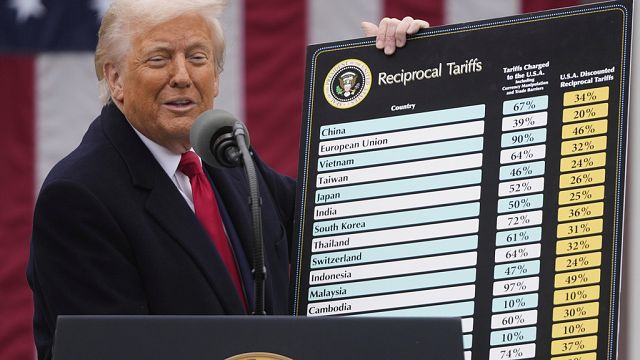How the $1,000 ‘Trump Accounts’ for Newborns Will Work


American babies born this year through 2028 are eligible to receive $1,000 from the government for a new type of account that is aimed at helping families get their children off to a strong economic start.
The so-called Trump accounts, created as part of the tax and spending plan signed into law by President Trump, are structured as a sort of hybrid individual retirement account, financial experts said. The unique twist comes in the form of seed money from the federal government. About 3.6 million babies are born in the United States annually, potentially putting the tab at several billion dollars for each year that the seed money is provided.
The accounts had initially included requirements that encouraged spending the funds before the children reached age 30. But their structure underwent significant changes during negotiations in the Senate.
“It has shifted more to a retirement product,” said Madeline Brown, a senior policy associate with the Urban Institute who studies financial security. That’s somewhat puzzling, she added, since several types of retirement accounts are already available. “It’s hard for me to tell what the goal of this program is,” she said.
Nevertheless, for eligible newborns, the one-time contribution can be a boon, financial experts say. “Who’s going to say no to $1,000?” said Cheryl Costa, a financial adviser in Framingham, Mass.
Policy and tax analysts said that they had been wading through the law’s text and that many details about the accounts, like how they would be opened and funded, awaited clarification from the Treasury Department.
The Treasury Department and the Internal Revenue Service did not respond to emails seeking comment.
“My sense is there is still work to be done to get it up and running,” said Alex Muresianu, a senior policy analyst at the Tax Foundation, a think tank that generally favors lower taxes.
When will the accounts become available?
They are expected to become available next July.
Tom O’Saben, director of tax content and government relations at the National Association of Tax Professionals, said details of how the accounts will be opened and funded remain to be seen. “It isn’t clear,” he said.
Who is eligible for the one-time government deposits?
The government will make a one-time contribution of $1,000 to each account for babies who are U.S. citizens born during 2025 through 2028 (aligning them with Mr. Trump’s current term in the White House) and have been assigned Social Security numbers. There are no income criteria.
Are there limits on contributions?
Parents, family members and employers can contribute additional funds to the accounts, up to $5,000 a year. There’s no tax deduction for contributions made before a child turns 18, but funds provided by employers — up to $2,500 a year — won’t count as taxable income.
Ms. Brown at the Urban Institute noted that lower-income Americans might not have the ability to contribute extra money to the accounts while more affluent families could more easily afford to max out contributions. “I don’t see a way that this reduces wealth disparities,” she said.
How can the money be invested?
Money in the accounts must be invested in low-cost stock mutual funds or exchange-traded funds tracking a U.S. stock index, like the S&P 500. It’s not clear why accounts are restricted to stock funds, rather than holdings that may also include less volatile options, like bonds or cash.
But the idea behind the new accounts is that starting to invest early will give the money time to grow and to ride out market swings. Senator Ted Cruz, Republican of Texas, said in a news release that they would “unleash the power of compound growth and create new generations of capitalists.”
How soon can the money be withdrawn?
Funds generally can’t be withdrawn before the year in which the beneficiary turns 18.
What happens after the child turns 18?
At that point, it appears, the account will be treated as a traditional I.R.A., subject to the usual contribution limits and other requirements, said Ian Berger, an analyst with Ed Slott and Company, an I.R.A. advisory firm. Under I.R.S. rules, contributions to traditional I.R.A.s are tax deductible for people who qualify based on their income and other criteria.
Withdrawals from traditional I.R.A.s before age 59½ are generally taxed as ordinary income, plus a 10 percent penalty, which is waived in certain circumstances, such as using the funds to pay for higher education, for the birth of a child or to make a down payment on a first home.
Additional guidance is expected from the I.R.S. to clarify this, Mr. O’Saben said.
How can children benefit from treating the accounts as I.R.A.s?
Ms. Costa said the accounts could create a powerful I.R.A. because funds deposited for a very young child could remain invested and grow for decades. Many people don’t start saving for retirement until their early 30s. “To me, it’s a supercharged I.R.A.,” she said.
Ms. Costa often advises clients that they can save for their children’s retirement in an I.R.A. — typically a Roth version, which doesn’t offer a tax deduction for contributions but allows tax-free withdrawals — as soon as the children have earned income, which is often when they become teenagers.
But with the newly created accounts, there’s no such earned income requirement for children. Parents can get them started on saving for retirement far earlier.
Might some parents balk at saving in an account so closely associated with Mr. Trump, who is a polarizing personality? Perhaps, Ms. Costa said, but they would need to weigh that against the prospect of building future savings for their child. “I’d say try to get past that, because it’s free money,” she said.
Are the new accounts helpful for college savings?
College savings plans known as 529 accounts are generally a better option if the goal is saving for college, Ms. Costa said. The state-sponsored accounts have higher contribution limits and favorable tax treatment. (Some states offer tax breaks for 529 contributions, and withdrawals aren’t subject to income tax when spent on eligible education expenses.) “For college,” she said, “I prefer the 529 account.”
What's Your Reaction?
 Like
0
Like
0
 Dislike
0
Dislike
0
 Love
0
Love
0
 Funny
0
Funny
0
 Angry
0
Angry
0
 Sad
0
Sad
0
 Wow
0
Wow
0








































